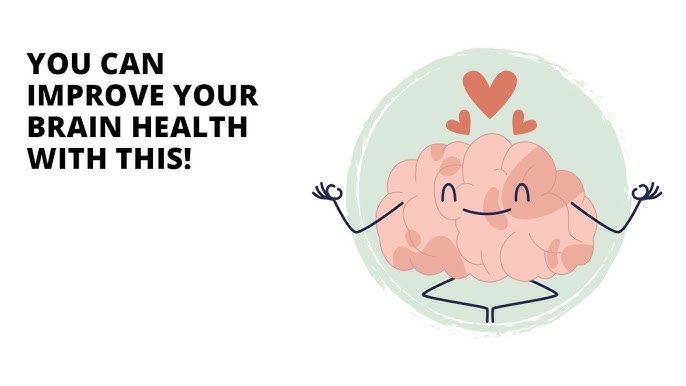🧠 How to Improve Brain Health & Prevent Alzheimer’s: Science-Backed Habits You Can Start Today
Introduction: The Brain Needs a Game Plan
Our brain is the control center of our body — but it’s vulnerable to aging, inflammation, and chronic disease. With Alzheimer’s on the rise globally, protecting your brain is no longer optional.
The good news? Up to 40% of dementia cases may be preventable with the right lifestyle. Let’s explore how to keep your brain sharp, focused, and resilient — for life.
🍳 1. Eat for Brain Power: Top Foods for Cognitive Health
🥬 Leafy Greens & Cruciferous Veggies
- Spinach, kale, broccoli & Brussels sprouts
- Rich in folate, lutein, and antioxidants linked to slower cognitive decline
🫐 Berries (Blueberries, Blackberries)
- High in flavonoids and anthocyanins
- Improve memory, delay brain aging
🐟 Fatty Fish (Salmon, Sardines, Mackerel)
- Packed with omega-3s (DHA), crucial for brain structure
- Associated with lower risk of Alzheimer’s and depression
🍳 Eggs
- A great source of choline, essential for neurotransmitter function and memory
🧂 Turmeric
- Contains curcumin, a powerful anti-inflammatory compound
- May reduce beta-amyloid plaques in the brain
☕️ Green Tea & Coffee (In moderation)
- Contain caffeine and antioxidants that boost alertness and protect neurons
🧘♀️ 2. Exercise Your Mind & Body
🏃♂️ Physical Exercise
- Increases blood flow to the brain
- Boosts brain-derived neurotrophic factor (BDNF), which supports memory and learning
- Best choices: walking, aerobic workouts, strength training, and yoga
🧩 Mental Stimulation
- Reading, puzzles, playing music, or learning new skills
- Keeps neural pathways strong and flexible
🗣️ Bilingualism or Learning a New Language
- Engaging both hemispheres of the brain
- Linked to delayed onset of cognitive diseases
😴 3. Prioritize Restorative Sleep
- During deep sleep, the brain clears out toxins like beta-amyloid
- Poor sleep = increased risk of cognitive decline
- Aim for 7–9 hours of uninterrupted, quality sleep per night
Sleep Tips:
- Stick to a routine
- Limit screen time before bed
- Keep your bedroom cool, dark, and quiet
🧘♂️ 4. Manage Stress Before It Manages You
- Chronic stress leads to elevated cortisol, which shrinks brain regions like the hippocampus (memory center)
- Mindfulness, deep breathing, meditation, or even forest bathing can help regulate stress responses
👥 5. Stay Socially Connected
- Isolation increases risk of Alzheimer’s by up to 60%
- Meaningful conversations and strong relationships help preserve cognitive function
🍽️ 6. Try a Brain-Supportive Diet
🥗 Mediterranean Diet
- Emphasizes vegetables, fish, olive oil, whole grains
- Associated with reduced risk of neurodegenerative diseases
🥑 MIND Diet (Mediterranean-DASH Intervention for Neurodegenerative Delay)
- A hybrid of the DASH and Mediterranean diets
- Specifically designed to protect against Alzheimer’s
- Focuses on: green leafy vegetables, berries, nuts, whole grains, beans, and limited red meat
⏱️ 7. Consider Intermittent Fasting
- May reduce oxidative stress and promote autophagy (clearing damaged cells)
- Linked to improved brain plasticity and reduced inflammation
🧬 8. Get Regular Health Screenings
- Manage chronic conditions like diabetes, high blood pressure, and obesity
- These are major risk factors for cognitive decline if left untreated
🔬 9. Explore Nootropics & Brain Supplements (Cautiously)
Some promising natural options include:
- Lion’s Mane Mushroom – may promote nerve growth factor (NGF)
- Ginkgo Biloba – improves circulation to the brain
- Omega-3 DHA – essential for cognitive health
- Bacopa Monnieri – shown to improve memory and reduce anxiety
Always consult your doctor before starting supplements.
🌿 10. Live With Purpose
- People with a strong sense of purpose have better memory, less stress, and longer lives
- Volunteer, mentor, explore creative passions, or contribute to your community
✅ Conclusion: Protecting Your Brain Starts Now
Brain health isn’t just about avoiding disease — it’s about thriving cognitively as you age. By making small, consistent lifestyle changes, you can reduce your risk of Alzheimer’s and live a sharper, more focused life.
You have more control than you think. Start today.




